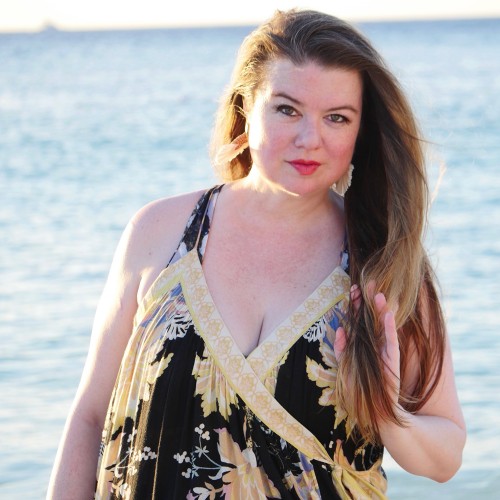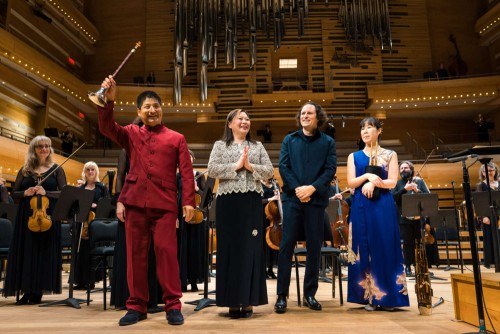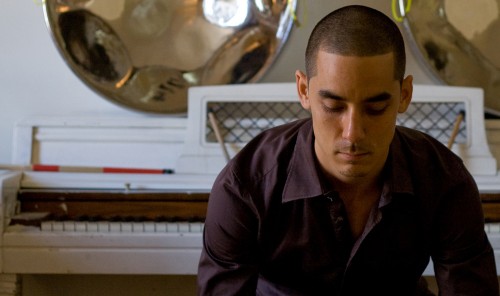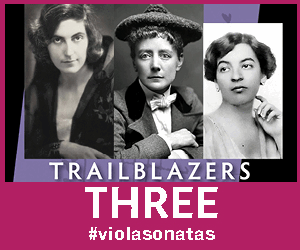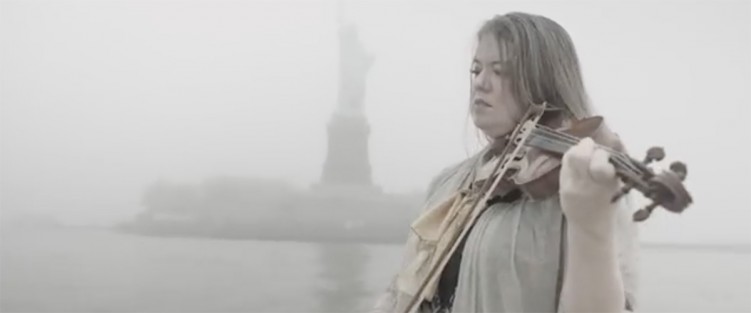 It was an inspiring moment for me – one that revitalized my love of music which can sometimes become dulled by too much media exposure. The moment I’m speaking of was listening to and watching one of violinist Lara St. John’s performances on YouTube and finding myself absolutely mesmerized by a full-on sensory experience where sound, image and raw emotion became completely intertwined, in her performance of Czardashian Rhapsody, by composer Martin Kennedy. Accompanied by pianist Matt Herskowitz, the two of them raised the roof with their joyful and outrageous performance of two Hungarian tunes, in a performance that is available on her album Shiksa released in 2015. By the end, I was left breathless and full of wonder at her incredible artistry.
It was an inspiring moment for me – one that revitalized my love of music which can sometimes become dulled by too much media exposure. The moment I’m speaking of was listening to and watching one of violinist Lara St. John’s performances on YouTube and finding myself absolutely mesmerized by a full-on sensory experience where sound, image and raw emotion became completely intertwined, in her performance of Czardashian Rhapsody, by composer Martin Kennedy. Accompanied by pianist Matt Herskowitz, the two of them raised the roof with their joyful and outrageous performance of two Hungarian tunes, in a performance that is available on her album Shiksa released in 2015. By the end, I was left breathless and full of wonder at her incredible artistry.
she/her/hers at 21C
Thanks to the upcoming 21C music festival, Toronto audiences will have an opportunity, on January 20th, to have their own experience of this Canadian-born performer, when St. John will present the music from her 2022 album entitled ♀she/her/hers. This project features 17 original works for solo violin by 12 women composers, with some of the pieces written for her, and others in her own arrangements. The album, released by Ancalagon Records, is part of St. John’s vision to use the platform she has “to raise up voices that have been muted all these years”, she told me in our recent interview. It is part of her fight for women’s rights and other marginalized voices in music. The repertoire choices began with an interest in solo violin works and a desire to do something beyond “another encore of Bach”, she said with a chuckle. She turned to the Caprices composed by Sophie- Carmen Eckhardt Gramatté (1899–1974) which she found to be very violinistic and descriptive. The album gradually took shape with pieces composed by friends Valerie Coleman, Jessie Montgomery and Milica Paranosic, and her own arrangement of Statue of Liberty by Laurie Anderson, who will be performing herself at the 21C Festival on April 5.
Gender Inequity
St. John is passionate about her vision to address gender inequity within musical institutions. Her story of being repeatedly sexually abused by her renowned violin teacher Jascha Brodsky while a teenage student at the Curtis Institute of Music in Philadelphia during the mid 1980s finally became public in a 2019 article in the Philadelphia Inquirer. As recounted by NPR, for many years, St. John’s claims were repeatedly denied and jokingly dismissed by the administration, and it was not until 2013 that the board finally agreed to hire a law agency to investigate not only St. John’s reports but other female students who subsequently came forward. The investigation found, 35 years later, that her allegations were credible and subsequently Curtis has issued an apology.
St. John has not only has been public about the rampant sexual abuse she and others have faced, but also about the lack of gender equity in the principal roles within leading orchestras, as well as in the programming of works by women composers. One story she relayed to me in our conversation featured comments made by the Israeli conductor Talia Ilan who was quoted in the San Francisco Chronicle as saying that due to blind auditions, “we know that talent is equal between the two genders. But if you look at composition and conducting, only 5 to 10% of those roles are filled by women. That’s a hell of a lot of mediocre men who have a very vested interest in keeping women down.”
“Exclusion of women correlates directly with violence against women,” St. John went on to say, “and that’s something that really nobody can get behind. What I’m campaigning for is systemic change throughout the culture.” She gave as an example the kinds of damaging comments made repeatedly by the Soviet-born conductor Yuri Temirkanov, who died this month at age 84: “Women are the essence of weakness, and conducting is the essence of strength, so women shouldn’t conduct,” he was quoted as saying. In St. John’s experience in the performing world, this mentality is pervasive. “I think the only way to get rid of this is to start screaming from the rooftops which is basically what I’ve done.”
Creating change
One hopeful and positive sign she spoke of is the Boulanger Initiative, an organization in the USA committed to promoting music composed by women through performance, education, research, consulting, and commissions. This includes publishing music by women from earlier centuries that has been long buried. She also cited examples of women being appointed composer-in-residence for orchestras in Chicago and Philadelphia. Hopefully this will spread to other major leading orchestras (as it already has here in Toronto).
Creating change in attitudes is also at the heart of her upcoming film documentary. After the article in the Philadelphia Inquirer was published, it was read far and wide and St. John received hundreds of letters of support, along with multiple stories of other women’s experiences in music. She decided to go on the road with her camera and conduct interviews with some of the people who wrote to her and it is these stories that will form the narrative of the film. She does all her own post production as well, having started video editing 14 years ago, initially because she couldn’t find anyone who knew how to synchronize violin properly. Many of her performances are available as music videos and can be viewed on YouTube, which I heartily recommend.
In her 21C concert on January 20, she will also be performing a solo Bach Sonata: as she says, “there’s no way anybody writes for solo violin without some kind of influence from him (i.e. Bach)”. She highlights this in the program notes she has written, pointing out similarities between Bach’s approach and how those techniques end up in the contemporary repertoire she is performing. “It will create a lot of interesting juxtapositions”, she said.
Other upcoming events include a few firsts for her. She has been invited by one of Estonia’s orchestras to perform Scottish Fantasy written in 1880 by Max Bruch. “It’s a piece you often play in your teenage years,” she said, “but I never did. Now I’ve been asked to make it more Scottish.” She’s decided to insert traditional Scottish tunes in between the movements and change some of the cadenzas in response to this request. Another first will be a performance of a Schoenberg concerto in June in Buenos Aires. And finally, back to the 21C festival, she will be performing in a work by Turkish pianist Fazil Say in his January 19th concert, along with her brother Scott St. John and others.
The Feast Continues
The feast of new music continues after the 21C Festival when Esprit Orchestra present their program on January 24 titled Three, with works by Misato Mochizuki from Japan, Unsuk Chin from South Korea/Germany, as well as the Toronto premiere of Birds Calling... From the Canada in You by Rita Ueda, the recipient of the 2022 Azrieli Music Prize for New Canadian Music. Ueda’s work, composed for shō, sheng/suona & orchestra was premiered at the December 2022 Azrieli Music Prizes Gala Concert.
“Other than a handful of beautiful songbirds (white throated sparrows, loons, blue jays, cardinals, etc.), many of the most iconic birds of Canada (hummingbirds, Canada geese, arctic cranes, puffins, snowy owls, etc.) are not songbirds. They generally screech, grunt, and shriek” Ueda said of the work. “Yet they are much loved by us Canadians. I thought this parallels the way Canadians take in immigrants from all over the world, regardless of where they come from.”
UTNMF
Three days later, the U of T Faculty of Music’s New Music Festival commences, running from January 27 to February 4, featuring Marjan Mozetich as this year’s Roger D. Moore Distinguished Visitor in Composition. This festival of performances, lectures, and master classes will also welcome the Gryphon Trio, the Penderecki String Quartet, John Burge, and accordionist Joseph Petric, among others.
The final concert of the festival on February 4, 2024 will be a special event with a performance of American Andy Akiho’s monumental percussion work Pillars. The piece, written for the Brooklyn-based Sandbox Percussion Quartet, premiered in December 2021 after a lengthy period of creation. The composer states that the piece was written specifically for the individual performers in the quartet; each of the seven Pillars, or quartets, are inspired not only by architecture, but by the personalities of each performer. The Grammy-nominated album also includes accompanying videos for each of the Pillars.
Soundstreams
To celebrate the upcoming festive season in December, Soundstreams will once again present another iteration of their Electric Messiah performance, a stripped-down version of Handel’s Messiah. The performances this year run from December 14 to 17 at Theatre Passe Muraille and will deliver a mix of arias and choruses in a variety of musical styles, ranging from jazz, gospel, and hip-hop to classical. Guided by composer and synth performer Adam Scime, the five singers and additional four instrumentalists will recreate the classic narrative with its themes of love, betrayal, joy and redemption. Soundstreams returns on February 3 with a concert of vocal works performed by the Estonian Philharmonic Chamber Choir, including works by Arvo Pärt and Palestrina, and a world premiere by Canadian Omar Daniel.
Wendalyn Bartley is a Toronto-based composer and electro-vocal sound artist. She can be reached at sounddreaming@gmail.com.



